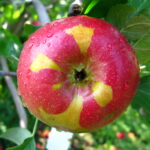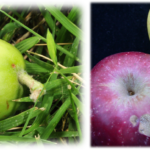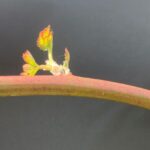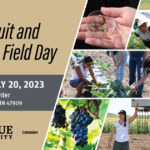At the Meigs Horticultural facility we are now seeing, more clearly, the damages from the April 24th freezing temperatures. All fruit crops are starting to grow out of that damage, which is good to see. I would still say that our loss on crops across the farm is 10-15% except for the Shiro Plums. The[Read More…]
Pome Fruits
Tank mixtures (or tank-mixing) describes the process where multiple crop protection chemicals are combined in a single tank for simultaneous application. Tank-mixing pesticides allows the grower to make a single application but manage multiple pests AND pesticide resistance issues. All specialty crops, especially fruit crops, have more pests and pathogens than field crops, along with[Read More…]
At the Meigs Horticultural facility on April 24th we experienced freezing temperatures from 2 am until 7 am, with a low of 26.8 degrees Fahrenheit for one hour. The damage to fruit crops on the farm is scattered depending on varieties. A rough estimate would be 10% cold damage on the crops. The growth stages[Read More…]
The plum curculio (Conotrachelus nenuphar) is a small “snout” beetle (also known as a weevil – one of my favorite beetle groups!) that will feed on apples, peaches, pears, plums, and cherries. Both adults and larvae have chewing mouthparts and can damage fruits; adults by feeding and laying eggs in newly set fruit and larvae[Read More…]
We’re getting close to the time when growers need to make chemical thinning decisions – for many the most perplexing and risky decision they will make all year. This is usually a tricky call to make. Remember that only about 5-10% fruit set is usually enough for a full crop. In other words, 90 out[Read More…]
Once flowers open in the spring, we’re hoping for warmer weather so the bees will transfer pollen and for rapid pollen tube growth. As we all know, apples require cross pollination, so for example Golden Delicious pollen will not fertilize Golden Delicious flowers. We rely on bees and other insects to transfer pollen from one[Read More…]
In just two weeks there has been significant bud development on our fruit trees here in Lafayette, IN. Our Shiro Plums are in full bloom and the bees are busy pollinating these trees. There is one Apricot and some early season Apple trees in our mixed variety blocks that are also in full bloom. All[Read More…]
Something happened when the calendar switched from March to April. Spring finally sprung. As we discussed in the last issue of FFF, spring temperatures are so important because the rate of crop development in the spring is directly related to how warm it is. Here in Lafayette, April average temperatures have been in the 50s[Read More…]
As we continue to walk on really expensive eggshells in 2023, it’s important to recognize that fungicide availability along with the effectiveness of available fungicides (and their price) will impact orchard, vineyard and berry patch management 2023. For all growers, the number 1 problem continues to be fungicide resistance in a diversity of fruit crops.[Read More…]
Purdue Extension presented its first Fruit, Vegetable and Hemp Field Day post-pandemic at the Meigs Ag Center in July 2022. Extension Specialists and Graduate Students presented specialty crop research to 45 attendees. Attendees had only good things to say about the event. ” Great information and research.” “Great variety of experiences and knowledge.” “I felt[Read More…]






